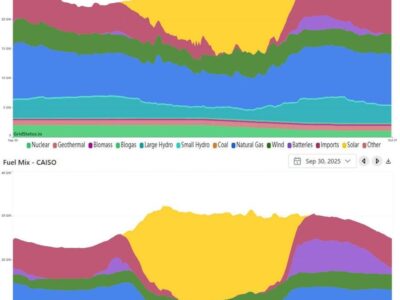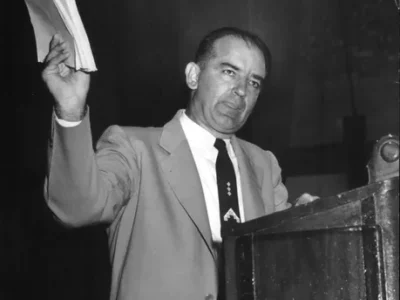The Tariff Case & Environmental Law
The Court’s ruling could open doors legally for some future environmental actions.
The Trump tariff case will be argued tomorrow. It will have enormous political and economic importance. It should also clarify legal doctrine. In this post, I explain how the Court’s decision could impact environmental law, a topic that seems far removed from trade policy. Ironically, a ruling for Trump could empower future environment policies. A ruling against him, on the other hand, would help resist other Trump environmental initiatives.
There is no gainsaying broader implications here that go far beyond environmental law. A win for the President will be taken, by Trump and many others, as a sign that the Court intends to give him free rein. A loss for the President will strike at one of his key policies and be taken as a sign that he is still subject to serious legal restraints. Either way, there will be an impact across many policy domains, including the environment. But how the Court gets to its decision will also matter.
- Does the power to “regulate” include the power to tax?
The main statute at issue, the International Emergency Economic Powers Act (IEEPA), gives the President the power to regulate transactions with foreigners. It doesn’t say anything about tariffs or taxes. The government’s argument is that tariffs are just one way to regulate trade. If the Court agrees that a tax is just a form of regulation, it might serve as the basis for an argument for regulatory agencies like EPA to use taxes or fees as regulatory tools.
The best supporting rationale for the government’s argument is that Nixon imposed tariffs under a predecessor of IEEPA that were upheld by a lower court. When Congress passed IEEPA, the government argues, it silently incorporated that lower court ruling into law. In the past, the Court hasn’t been terribly receptive to the argument that Congress must have meant to incorporate an earlier lower court ruling into law without ever saying so. If the government’s “incorporation by silence” argument is successful, similar arguments could be useful to environmentalists. The Clean Air Act was amended extensively in 1977 and in 1990, and environmentalists would love to argue that well-known lower court decisions from those periods are now embedded in the statute itself.
- Does the case raise a “major question”?
The major question doctrine (MQD) says that Congress needs to be clear if it wants to give the executive power to make a decision of “vast political and economic significance.” Trump’s “Liberation Day” tariffs certainly meet that standard. There are two arguments that, nevertheless, the MQD doesn’t apply here.
The first Trump Administration argument is that the MQD doesn’t apply to decisions made by the President. Although the MQD has been applied in the past to decisions made by agencies, in almost every case the actual initiative came from the White House. So this argument rests on a fiction. And in any event, under the unitary executive doctrine, it’s not clear that there’s any difference between a delegation of power to an agency and delegation to the President. In any event, if the Court adopts this theory, pro-environmental Presidents should formally direct EPA to adopt specific major policies, taking White House ownership of the policies.
The second Trump Administration argument is that the MQD doesn’t apply to foreign affairs. That’s a very slippery standard because so many things now have international implications. But judicial acceptance of this argument could redound to the benefit of climate regulation. In West Virginia v. EPA, the current Supreme Court applied the MQD to invalidate pathbreaking EPA regulations of power plants under the Clean Air Act. But there’s another section of the Clean Air Act (§ 105) dealing specifically with U.S. emissions that harm foreign countries. Because that section involves foreign affairs, EPA might be able to issue exactly the same kind of regulations under that section while avoiding the MQD.
As I’ve explained in an earlier post, a government win in the tariff case would also appear to allow a later President to impose carbon tariffs on imports and cut off sales of fossil fuels to foreign countries.
- Can a court review the substance of a President’s emergency actions?
One off-ramp that might be appealing to some Justices would hold that tariffs are permitted by IEEPA but that a court can review the reasonableness of the way the tariff Is implemented. That would allow challenges to the tariffs initially set on individual countries to see whether they made sense given Trump’s justifications.
For instance, Trump used the alleged economic emergency to impose tariffs on countries where we have a positive balance of trade, which is hard to square with his rationale. He also imposed a tariff on Brazil but then increased it when the Brazilian government went after Trump-wannabe Jair Bolsonaro. That’s also hard to connect with the balance of trade justification. A holding along these lines would allow Trump to say that the Court had upheld his general power to impose tariffs while allowing lower courts to overturn many specific tariffs.
If the Court did go this way, environmentalists would have greater power to challenge many of Trump’s emergency actions, including the anti-environmental decisions made under the so-called “energy emergency.”
Finally, it’s conceivable that the Court might hold that the balance-of-payments problem that Trump labeled an emergency lacks the suddenness and the urgency to qualify, or that it just isn’t serious enough. That seems unlikely, but it would have clear repercussions in other areas where Trump has used emergency powers. A judicial decision along these lines might be based on the nondelegation doctrine, which is much beloved of the Court’s most conservative Justices.
Oral arguments aren’t always good gauges of where the Court will end up in a case. Still, tomorrow’s arguments should give us some indications of the Justices’ thinking. A lot will be riding on the outcome.







Reader Comments